My Current Research Focus
On the following projects, I have primarily collaborated with incredible Adelaide researchers from Behaviour-Brain-Body Research Centre and the Australian Research Centre for Interactive and Virtual Environments.
Virtual Reality Aftereffects
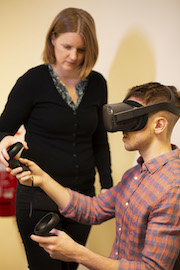
Virtual reality sickness (or Motion Sickness) has plagued the VR industry since the early days. Improvements with device features such as field of view, screen resolution, latency, and tracking accuracy, have all made it possible for most people to better tolerate modern head-mounted displays.
Despite recent advancements with VR technologies, about 15-20% of people still self-report adverse symptoms from using head-mounted displays. Current research suggests that spending time in VR can result in changes to vision, cognition and balance. Hence, all VR device manufacturers have safety guidelines and warnings not to drive, operate machinery, or make decisions of any consequence until recovery.
It is not known whether a user can accurately judge subtle changes in depth perception, imbalance or cognitive processing which could put themselves or other people at risk. This research could have implications for how we understand aftereffects, measure VR sickness, and the safety guidelines for using head-mounted displays. The aim of this research is to better understand and characterise visual, cognitive and balance aftereffects and to assess whether these aftereffects can lead to negative consequences in the real world.
Primary Collaborators: A/Prof Tobias Loetscher; A/Prof Celia Chen; Dr Jim Saredakis; Mr Stefan Michalski; A/Prof Ross Clark; Prof "Skip" Rizzo and Dr Brandon Birckhead
Key Research Articles:
(2) Exergaming with Beat Saber: An Investigation of Virtual Reality Aftereffects.
(3) Beyond Feeling Sick: The Visual and Cognitive Aftereffects of Virtual Reality.
(4) Rest intervals during virtual reality gaming augments standing postural sway disturbance.
Transferring Skills Learnt in Virtual Reality to the Real World
A key assumption of VR training is that if a virtual environment mimics a real world training environment then people can learn skills and get better in the real world. In areas such as sports training and vocational training, the research testing this assumption is not yet established.
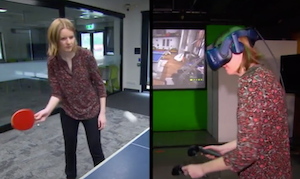
Starting out as an Honours project on learning Table Tennis skills in Eleven: Table Tennis VR and testing whether novice table tennis players got better in the real world, this research evolved into a key publication in its field and has garnered much attention.
Primary Collaborators: A/Prof Tobias Loetscher; Mr Stefan Michalski; Table Tennis Professionals: Paul Langley (President) and Kay Crowell (Director) of Table Tennis SA.
Key Research Articles:
(1) Getting your game on: Using virtual reality to improve real table tennis skills.
(2) Using Virtual Environments to Improve Real-World Motor Skills in Sports: A Systematic Review.
A major focus of my research over the past two years is working on a project funded by SA Health. The purpose of this project is to develop a VR training tool that can be used by remote community healthcare workers to learn how to assess and manage chronic diabetic foot wounds.
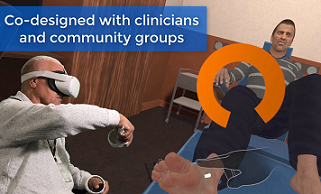
In collaboration with the South Australian Health and Medical Research Institute (SAHMRI), the University of South Australia (UniSA), the University of Adelaide (UoA), and the South Australian Aboriginal Chronic Disease Consortium, we have developed a virtual reality (VR) education program for rural health practitioners focused on improving the diagnosis of diabetes-related foot complications (DRFCs) within the Aboriginal community.
We are currently involved in the community engagement phase of our tool see link for a short demonstration: Clinical Virtual Reality Training: Managing Chronic Diabetic Wounds in Regional Clinics.
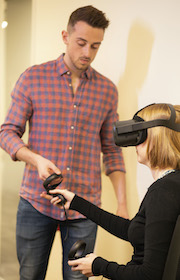
After the Table Tennis study, Stefan was awarded a PhD scholarship to assess the effectiveness of VR as a tool to improve real-world behaviour and skills for individuals with intellectual disabilities.
An intellectual disability is a neurodevelopmental disorder characterised by significant deficits in intellectual functioning (i.e. reasoning, problem solving, planning) and adaptive functioning (social, conceptual and practical skills). Many people living with an intellectual disability are dependent on their families to help with everyday tasks requiring basic life skills. Learning how to look after oneself is an important step in developing and maintaining independence.
VR may provide a safe and repeatable environment for people with an intellectual disability to practice life skills. Furthermore, people living with an intellectual disability have been shown to learn better through practical hand-on activities and this is where VR is well suited.
Primary Collaborators: Mr Stefan Michalski; A/Prof Tobias Loetscher; Dr Gun Lee; Associate Professor Caroline Ellison
Key Research Articles:
Sensing Reality: Comparing Virtual Reality to the Real World
There are several studies I have been involved in which fall under this project banner. Some of these studies are yet to be published, hence I will add more content here at a later stage and perhaps include some exciting new findings.
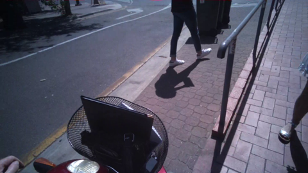
One of these studies that I would like to highlight is a usability study comparing how older adults experience real and virtual environments of the Glenelg Jetty Road area.
It has been an interesting challenge conducting studies outside the lab, but it has also been really exciting to try out experimental methods and new technologies in the real world.
I should have some intriguing new findings and visuals to share later this year. So if you are keen to read more about this study, check back at a later stage.
Primary Collaborators: Dr Jun Ahn; and Dr Gun Lee